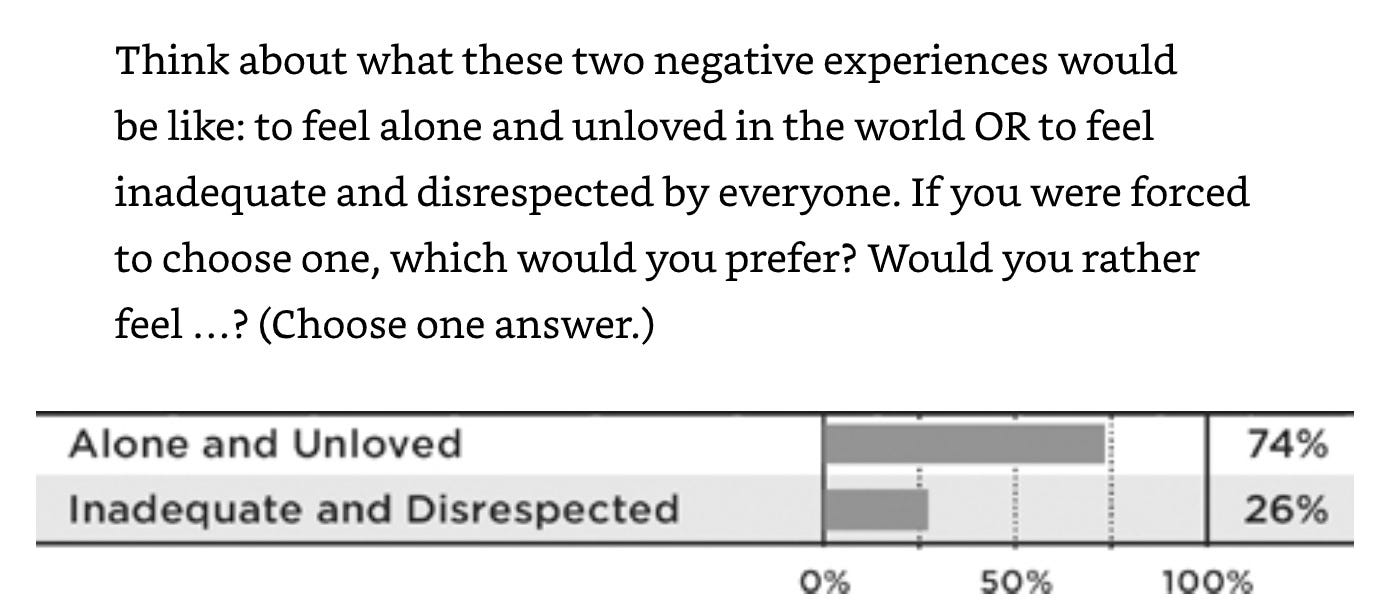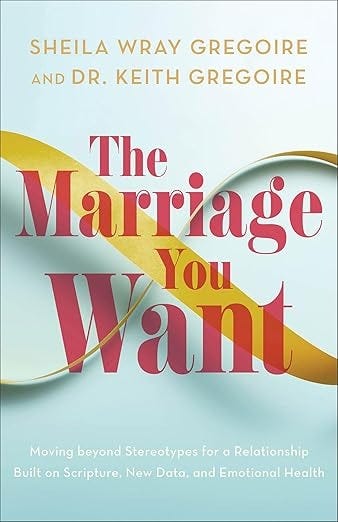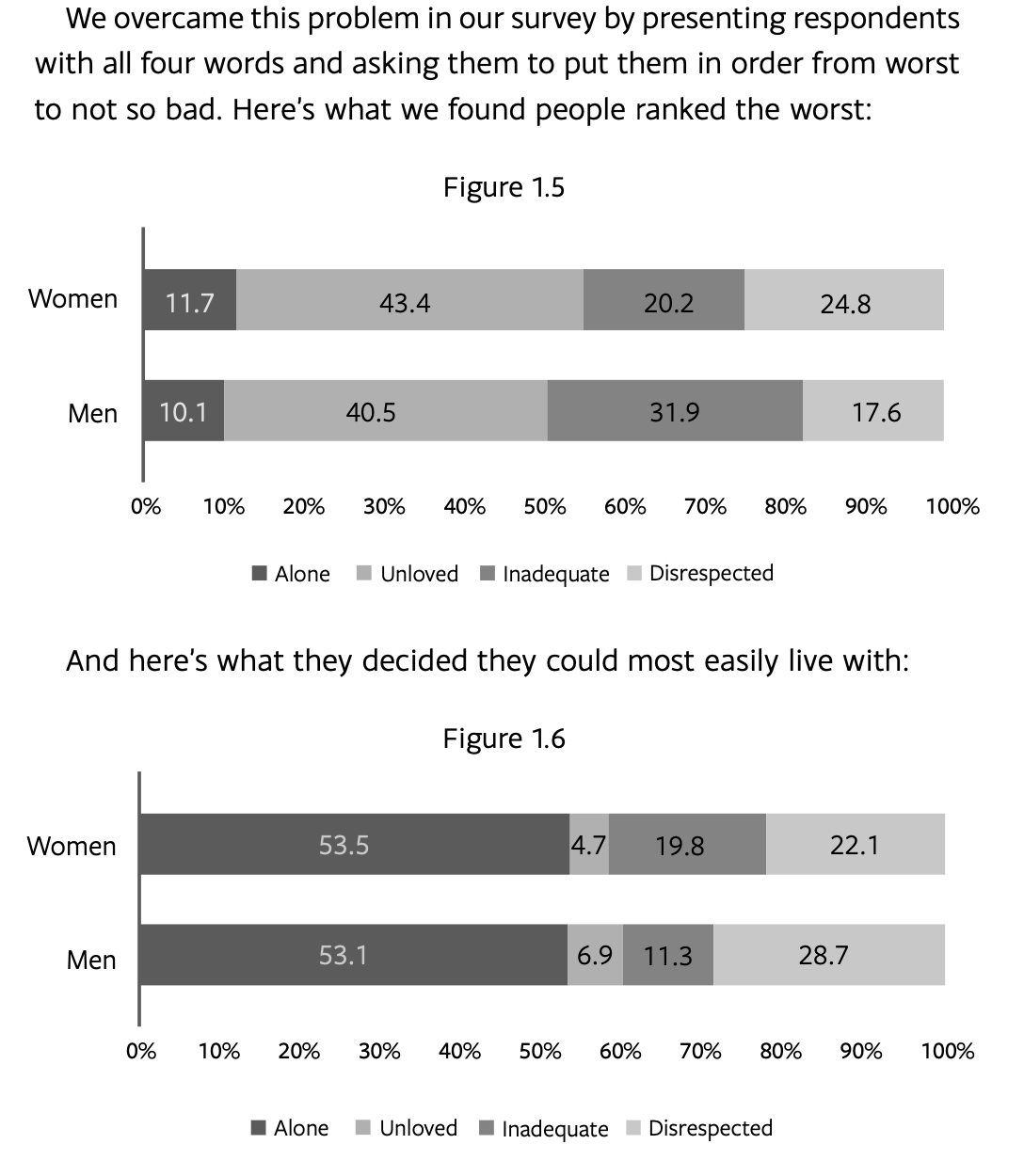Debunking the Love & Respect Thesis Definitively, Once and For All
Is it really men who need respect?
Usually when people start on a new platform, their first post is an introduction to who they are and what they care about.
I’m not going to do that, because most of you reading this already know me (and thank you for following me over here too! Excited to get started).
Instead, I’m going to dedicate my first ever post on Substack to the same topic that got me started on my current path: Quite simply, we’ve got to end the scourge that is the book Love & Respect, along with the whole thesis that men need respect while women need love.
And in this post, I’m going to do that—with all new data. It’s pretty awesome (and it’s coming in just a few paragraphs!)
Before that, though, I want to give some context.
Most of you know me because for the last six years we’ve been critiquing the evangelical take on marriage and sex, and conducting the biggest research projects into evangelical women’s marital and sexual satisfaction. In 2021, our book The Great Sex Rescue was published, based on our initial survey of 20,000 women. We followed that up with The Good Guy’s Guide to Great Sex and the totally revamped The Good Girl’s Guide to Great Sex. And then we followed it all up with She Deserves Better, based on our survey of 7000 women and their experiences in church as teens.
(Whoops. I guess I introduced myself after all!)
We wanted to know how the way the evangelical church talks about sex and marriage impacts women, men, and couples long-term.
And it’s not pretty.
It’s our plea that the church gets well.
We are calling for the church to remember Jesus’ words that a bad tree can’t bear good fruit, and a good tree can’t bear bad fruit. He said that if you’re trying to figure out if a teacher is good, you look at the fruit.
We’re asking people to take Jesus at His word and look at the fruit. Let’s stick with healthy, evidence-based, and Jesus-centered.
Okay, that’s the background.
Now let’s go just a little bit further back, before we fast forward to the present (and to why we have this all-new data!).
Even though I became more widely known in 2021 when The Great Sex Rescue was published, I’ve actually been writing in the evangelical marriage space since 2008. I had several sex books published. I was friends with Gary Thomas and Shaunti Feldhahn. I was on my way up.
And then, one Friday afternoon in January of 2019, I read the book Love & Respect.
And a nuclear bomb went off in my living room.
Up until then I hadn’t read a lot of Christian marriage books because I was petrified of plagiarism. I figured “they love Jesus, I love Jesus, we’re all saying the same thing.”
That Friday afternoon I realized that was a crock.
I read Emerson Eggerichs’ words that “if your husband is typical, he has a need you don’t have.” That need was for physical release. If he didn’t get it, he’d come under satanic attack. The need is so great you women will never understand it. And you need to minister to your husband sexually as unto Jesus Christ.
Excuse me? And ICK!!!!!
At the time I read this, my daughter Rebecca Lindenbach was working for me, as was a family friend, Joanna Sawatsky, who had a Master’s in Epidemiology and was a statistician, but she was home with her baby and wanted something to do.
We realized how terrible this book was and wrote about it on the blog. I was inundated with messages about how the book had enabled abuse in women’s marriages, and so Joanna prepared a report to send to Focus on the Family, who co-publishes Love & Respect. We thought they would care (well, Rebecca knew they wouldn’t).
They didn’t.
So we wrote an Open Letter to Focus on the Family about Love & Respect which blew up.
And then we decided to go big or go home, and we started our survey for The Great Sex Rescue. We wanted to see how messages like those in Love & Respect affected people long-term, and we wanted to do it to academic standards.
(and we’ve since had our data peer-reviewed in the Sociology of Religion journal!)
Since then, every January I’ve addressed a different problematic aspect of Love & Respect, and will continue to do so until that blasted book is out of print, or until people stop buying it.
We’ve talked about how he distorted Scripture; how he ignores marital rape; how he thinks women just shouldn’t talk. It’s truly bizarre.
And, of course, how he gaslights emotional abuse victims.
And that brings us up to date, to 2025.
While we’ve been able to definitively show that his teachings harm women, increasing rates of sexual pain, decreasing orgasm rates, lowering marital satisfaction, and increasing abuse (see The Great Sex Rescue for all of that!)—
what we haven’t been able to do definitively—until now—is demolish his central tenet, that men need respect and women need love.
Let me explain what he based that claim on.
Biblically, it comes from Ephesians 5:33, which tells men to love their wives and women to respect their husbands (many biblical scholars think a better translation is “Men, love your wives in order that women may respect their husbands”, but let’s leave that for a moment. Eggerichs ignores all the other times in Scripture that we are all told to love others, and that men are told to respect their wives, but let’s leave that for a moment too.
He also claims that respect must be unconditional (which makes no sense; you can have unconditional love, but not unconditional respect).
But, again, let’s leave that for a moment.
Eggerichs also claims there’s a scientific basis for the claim, which he attributes to Shaunti Feldhahn’s research.
Feldhahn’s book For Women Only was published two months before Eggerichs’ book in 2004, and they obviously collaborated a bit so that her research made it into his book.
Let me explain how she decided that men needed unconditional respect.
She asked about 400 men this question:
The pilot survey takers said the question was unclear; the survey expert she hired said it was a bad question (she admits this in the book). But she says this proves her thesis—that men feel loved by being respected.
So because 74% of men said they’d rather feel alone and unloved than inadequate and disrespected, that means men prefer respect to love!
Several problems pop up here, and let’s take them one by one.
1. Shaunti Feldhahn never asked women.
Eggerichs and Feldhahn decided that men want respect and women want love without ever checking in with women. When a psychologist decided to put the same question, worded the same way, to women, 68% of women also chose alone and unloved. No significant gender difference.
Eggerichs and Feldhahn were so wedded to the idea that men and women were polar opposites that when they got men answering the way they wanted, they made the assumption that women would choose the other answer, without ever checking with them.
You can’t do that and call it research—yet they did, and together their books have sold 6,000,000 copies.
And countless pastors have used this idea, that men want respect an women want love, to tell women that they must let their husbands lead, must never correct their husbands, and must defer to their husbands in everything.
2. Shaunti Feldhahn’s survey question was worded wrong
There’s another huge, glaring error in the way that Shaunti Feldhahn worded this question. She used a double barrelled question set, which means people are reacting to two things in each of the two answers. And those two things are not synonyms.
Being alone is not the same as being unloved, and feeling inadequate is not the same as feeling disrespected. When you combine two things that are not synonyms and ask people to choose between two sets of two, you can’t know if they’re reacting to the “unloved” or the “alone”; to the “inadequate” or “disrespected.”
This year, we finally had a chance to put the Love & Respect thesis to the test.
We conducted yet another survey for our new book, The Marriage You Want, which launches March 11. Surveying 1300 matched pair couples, plus over 5000 other married individuals, we wanted to use a data driven approach to find what actually creates marriages that thrive.
Pre-Order The Marriage You Want here!
And in that survey, we presented people with the four words—alone, unloved, inadequate, and disrespected—and asked them to rank them in order from worst to least bad.
Are you ready?
Drumroll please.
Here are some of the charts from our chapter 1 sidebar in The Marriage You Want:
Got that?
BOTH men and women said it is worst to be unloved.
BOTH men and women said it isn’t so bad to be alone.
In fact, alone really isn’t that bad at all, and if you’re alone, feeling unloved doesn’t really register. So that’s why most people choose “alone and unloved.” It has nothing to do with not wanting to be disrespected; it’s because being alone means it really doesn’t matter how other people treat you.
It’s the rest of the answers that are interesting, though, because this is where you see gender differences.
Women actually hate being disrespected more than they hate feeling inadequate, but for men it’s reversed.
If we were to sum up the results, we’d say:
Both men and women need love, but when it comes to respect, women value it a little bit more than men do.
Oof.
On yesterday’s Bare Marriage podcast (episode 266), we also talked about a few more findings—like what happens to your marriage when you believe when you get married that “men want respect in a way that women will never understand.” So listen in to that—and pre-order The Marriage You Want so you’ll see it all, in lovely charts! (there are more than just those that I’ve put here).
(and when you pre-order, just forward me your receipt and you’ll IMMEDIATELY get access to our ALTERNATE ending, which we cut at the last moment, and you’ll get an invite to join our launch team—so you can get access to an early copy of the book as early as January 27!)
But this brings us to one final question.
If most men really don’t want to be unloved, then why do pastors and authors keep teaching that men want respect more than love?
I mean, just listen to this by Paul Washer (start around 25 seconds in):
He’s pretty sure he doesn’t want love!
What’s going on?
I think men are clinging to the idea that they need respect and don’t need love for two reasons:
Telling men they deserve unconditional respect is intoxicating. It means that men get to escape accountability for their actions, because their wives can’t challenge them. It means they get to make all the decisions and call the shots. Many men want that.
Looking to power rather than connection for what you want in marriage is a way to enable privilege while escaping vulnerability and intimacy. Admitting you need love means admitting you need to become vulnerable and emotionally open with your wife. Many men aren’t comfortable with emotional language and don’t want to do that (hence Emerson Eggerichs saying that men don’t want their wives to talk to them.) So it’s much more comfortable to say that men need respect.
And this whole thesis allows men to stay in power without having to be worthy of respect, while allowing men to escape accountability and the need to become vulnerable.
It’s a recipe for relational disaster—but it’s also a pretty good gig for many men who aren’t comfortable with intimacy.
Let’s sum up:
The supposed “scientific” backing for the idea that men need respect and women need love was bogus. It was based on a poorly worded survey question which was only asked of one half of the population of interest.
When a properly worded survey question was asked to both men and women, love was overwhelmingly chosen as the most important attribute, with women then preferring respect more than men did.
The idea behind the love & respect dichotomy has filtered throughout evangelicalism, and is taken as a given, despite the fact that there is no scientific backing for it, and the biblical support is extremely flimsy.
This idea has enabled abuse to flourish, by promoting the idea that men are in authority over women, and that to challenge a husband is somehow sinful.
This idea has silenced women’s voices, since it is seen as disrespectful to challenge a man or have an opinion different from his.
This entire thesis needs to go. It’s not based on data. It’s invalid. It’s unbiblical. And it’s harmful.
And if you know anyone who is still on the fence about Love & Respect, send them to our Open Letter to Focus on the Family, and to our summary of the issues with the book (with a download). Tons of my other posts are linked at the bottom of each of these posts.
And pick up The Marriage You Want (and its study guide you can use with small groups, your spouse, or even for premarital curriculum)! It’s a refreshing, validating, and inspiring marriage book. We’re not trying to guilt you into staying in a marriage you hate. We’re helping you create a marriage you love—which involves ditching ideas like love & respect!
Thanks for following me here on my first post on Substack ever—and I’d love to hear what you think!






Sheila, you may remember me from when we were both Books & Such clients — I’m proud of all you’ve accomplished.
My nuclear bomb experience in reading happened when I read the four Gospels, Matthew, Mark, Luke and John, and wrote down ONLY the words Jesus said regarding marriage and family issues. Why was it a nuclear event? Try it yourself, and see that there’s not a single “Christian” book I have EVER read about marriage and family that implements the specifics He said.
I will never ever forget the time in pre-marital counciling when I said something about "I know my husband's the head of the household" or whatever and branch president looked at me very seriously and said "Never EVER deny your spiritual power". My marriage is based on mutual respect and we make decisions together. We are a TEAM.